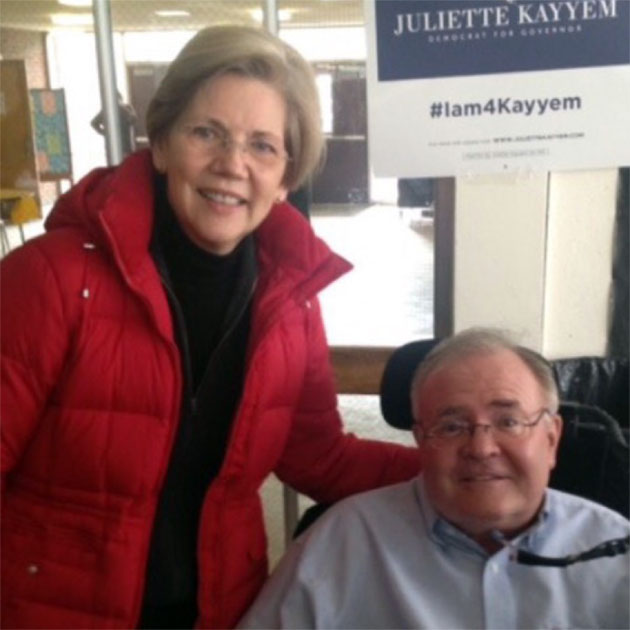You no doubt recognize the woman on the left in the image below—but not the man on the right. That’s a shame, given all he contributed to Mother Jones and scores of progressive campaigns, groups, and causes over a 40-year career. You don’t know him because he preferred modest anonymity to noisy celebrity—an old-fashioned attitude, alien to the always-online age but perfectly characteristic of this man of qualities.

Dodd with Senator Elizabeth Warren in 2014.
Robin Parker
But kick-starting Mother Jones was just the beginning: In the 1980s, Bill went on to work with (literally) scores of liberal and progressive causes and candidates. First as co-founder of San Francisco-based Parker/Dodd and then as head of his own firm, Dodd Smith Dann, he lifted a tiny environmental group called Greenpeace USA from a shoebox of supporters (their names handwritten on three-by-five cards) to nearly 750,000 members, in the process rocketing the organization from near-anonymity to global power and recognition. Bill Dodd was a founder of Mother Jones, an immensely creative and skilled tactician who was also far more than that, who had—in 1975, at age 24—helped conceive, launch, and build readership for this magazine as its audience grew from zero to nearly a quarter million in three short years, setting it on course for more than four decades of courageous muckraking journalism.
He proved invaluable to what’s sometimes called the democratic wing of the Democratic Party, locating hundreds of thousands of active supporters and volunteers—and tens of millions of dollars—for George McGovern, Ron Dellums, Ted Kennedy, Bella Abzug, Ed Markey, John Glenn, and Alan Cranston, to name a few. PETA used his talents to swiftly transform from a small, unnoticed local group into a national powerhouse.
When Hollywood producer Norman Lear, appalled at the religious-right intolerance of Jerry Falwell and Pat Robertson, decided to fight back, he turned to Bill for the launch of People for the American Way. The Sierra Club, the ACLU, Common Cause, Ralph Nader’s Public Citizen, anti-nuclear groups, investigative reporting funds, civil rights groups—a roll call of progressive politics and causes over the next two decades came knocking on Bill’s door, looking for the means to fight for justice and equality.
By the time he finally stepped back from his 60- to 70-hour workweeks in the mid-1990s, campaigns he’d orchestrated had raised more than $300 million from more than 2 million Americans—in the pre-internet days, this was a huge progressive reservoir of dollars, donors, and volunteers, as the nation struggled through the Reagan-Bush years.

Bill was, in short, a battlefield hero—but he never spoke of himself as one, in keeping with the qualities he admired and modeled. He was a battlefield hero in a second, quite different way: From the Mother Jones days onward, he battled multiple sclerosis.
His father, James Dodd, had died of it, and Bill had grown up watching the degenerative nerve disease rob his father of life, in terrible slow motion. The spasms, the fatigue, the neuropathy, and eventually the steady, inescapable loss of muscular control had stolen his father in stages. Those two hard decades took their toll, with James’ last years spent in wheelchairs and darkened rooms, while Bill’s mother, Marguerite, divided her life of constant motion and concern between her work as an elementary school art teacher and the demands of raising Bill and his two brothers and caring for her husband.
Marguerite Dodd repeatedly assured her sons that MS isn’t hereditary—but by the time he was 14, Bill knew that first-degree relatives like himself were nonetheless 10 times more likely to contract the disease, though no one knew why. There are lots of theories about MS, but little is really known about its causes even today—smoking may play a role, certain genes may have a part, stress (some think) could be a factor, some environmental conditions seem to be involved. A cure, more importantly, is still undiscovered.
As a teenager growing up in Sidney, Ohio, an industrial town northwest of Dayton, Bill had plenty of other things to think about. He loved school and was quite good at it, especially history, science, and math. He was also an athlete—a superb one, who earned eight varsity letters, set the school’s (still unbroken) record throwing the discus, and was named an all-Ohio quarterback his senior year with the Sidney High Yellow Jackets.
One day his father got a call from Woody Hayes, the legendary football coach at Ohio State. Was Bill interested in playing for him? It was an offer most high school players would have died for—but Bill had applied to other schools that wanted him. Harvard was one of them.
Bill said his friends all told him to go with Ohio, so it took some hard thinking to decide. But in September 1967, Bill Dodd walked proudly and expectantly onto the Harvard campus, a whole new world ahead of him.
By mid-winter of 1968, though, Bill knew that something didn’t sit right. “My high school co-captain was in Vietnam crawling around rice paddies,” he later recalled. “I was walking around Harvard. I couldn’t make the two things mesh. Finally I said, ‘I’m going to leave until I figure out my place in the world.’”
That search (after a second brief attempt at Harvard) put him, at just 20, on the streets, a college dropout without a job or a clear future. After a couple of false starts, he ended up in California, several thousand miles—and light years, culturally—away from both urbane Harvard and small-town Ohio. He figured it would be an adventure.
But he also began to notice something new about his body, something ominous. His legs at times felt pricked by pins and needles, then his hands would go numb suddenly, making it hard for him to write, open a door, or dial a phone. He waited for the diagnosis—but he knew what it would be. He had MS.
Almost by accident, Bill landed in a clerical job at a magazine in San Diego where he quickly advanced. Then came a second magazine job, this time in circulation and fundraising, at a think tank in Santa Barbara. Finally, at 24 he landed at the yet-to-publish Mother Jones in San Francisco. By then, his full-fledged specialty, built on his gift for math, was the esoteric world of subscription and donor acquisition and management. The complex testing matrices and meticulous mathematical assessment of results suited him, and he had a canny creative instinct for what might work next. (The work was all done with pencils, spreadsheets, and at first handheld Texas Instrument calculators—at the time considered a marvel of portable computing power). Bill ended up loving Mother Jones, his colleagues, the infinite quirkiness of San Francisco, and his hikes in the Sierras as much as the challenge of building a progressive startup with almost instantaneous nationwide impact so soon after Watergate.

At that point, he could have quit working, moved back to his family in Ohio, and gone on disability, knowing what lay ahead. But he didn’t. Instead he decided he’d try, as he put it, to “outrun” the disease. “We were just coming out of a period where, if you had MS, they would tell you just to go sit in a corner,” he once explained. “I tried to get as much in and as much out of my body as I could before [MS] caught up with me.”
So he went on building for others—Mother Jones, then Greenpeace, Ted Kennedy, Ron Dellums, and all those other campaigns and causes, keeping his MS a secret. And it worked until it didn’t, until after more than a decade of struggling, he could no longer walk upright and began to use a wheelchair.
The wheelchair was a turning point. Reflecting on his life, he decided he had some unfinished business to attend to. He needed to go back and finish his Harvard degree.
So in the fall of 2000, Bill Dodd returned to Harvard Yard in his wheelchair, with his partner, Shawn Grogan, who accompanied him to all his classes, took his notes, and typed the papers and wrote out answers to his exams as he dictated them to her. He—he liked to say “we”—proceeded to earn his long-put-off degree in government, graduating, as his degree noted, as a member of the Harvard Class of 1971 (2002).
There had been plenty of struggles getting there, but returning to Harvard had awakened him to a new life for his mind, whatever MS was doing to his body. He applied for graduate school at Harvard’s Kennedy School of Government. Asked by an admissions officer why, in his 50s now, he wanted more school, he replied simply, “I think it could help me find new ways to help people.”
Late last year, the terminal signs of MS began to appear. After finishing his two Harvard degrees, Bill had done what he’d planned: He went back to helping people. For more than a decade, as his body slowly kept giving way, he advised magazines, nonprofits, schools, causes, and politicians. “But by the mid-2000s,” he wrote matter-of-factly to classmates at their 40th reunion in 2011, “I had become a complete quadriplegic, and I am today becoming adept at a puff-and-sip power wheelchair, where I propel myself by puffing into a straw.”
That meant he couldn’t go to people, so they came to him, in his Cambridge condo a quarter mile north of Harvard Yard. But there had been tragedies over that decade of service: His partner, Shawn, died suddenly of lung cancer. His mother, in her 80s, moved to Cambridge to care for him, but she too died, at 92, also of cancer.
For the past two years, Bill had stayed mobile by blowing into that plastic straw that guided his wheelchair. (If you look closely at the picture of Bill with Elizabeth Warren, you can see the tube just below his smiling face.) He stayed in touch with the world, avidly followed the news (and sports), wrote emails with his dictation software and talked on the phone, often at length, with friends and colleagues.
Starting around Thanksgiving of 2016, though, Bill began to catch colds much more often, and the colds grew steadily worse, necessitating regular ambulance rides and hospital stays. “It wasn’t,” he observed, “much fun.”
Early this July, he went back into the hospital yet again, only to be sent home after a miserable five days. He recovered enough that, once home, he could read his emails, but his voice was too weak to dictate replies. He listened to phone messages, clearly pleased to hear from his friends, but had no way to answer.
His caregivers put him to bed on a Friday night. The next morning they decided to let him sleep late. But when they went in at 10 a.m., he didn’t awaken, so he was rushed off to the hospital once again. There, doctors found he’d suffered two massive bilateral strokes in the middle of the night; there was no chance of recovery.
Bill Dodd died at Boston’s Brigham and Women’s Hospital on Monday, July 17, at the age of 68. He lived a rich and wonderfully useful life. A man of qualities to the end, he left the world a better place.















